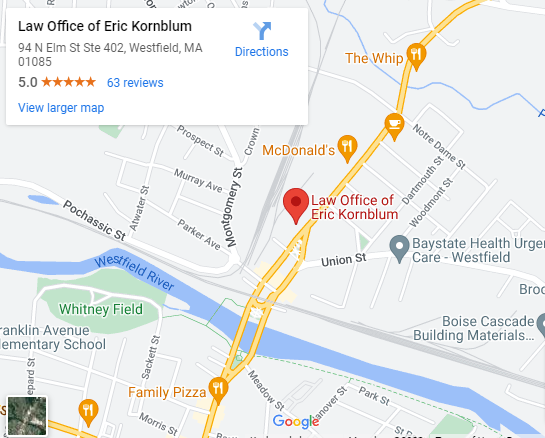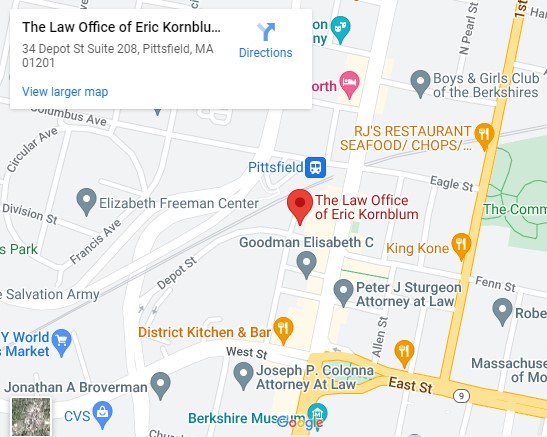Get Legal Advice on Bankruptcy Do’s and Don’ts
Bankruptcy can be a valuable tool for those facing financial difficulties, but it’s important to understand the rules and limitations that apply. Bankruptcy laws in Springfield, MA, are governed by federal regulations, which means that the rules on how often you can file bankruptcy in Springfield MA are the same as in other parts of the United States. However, it’s important to work with an experienced bankruptcy attorney in Springfield to ensure that you understand the specific requirements and procedures for filing in this area. This will help you make informed decisions about your financial future and take the necessary steps to achieve a fresh start.
If you’re facing financial difficulties and considering bankruptcy, don’t navigate the process alone. Contact the Law Office of Eric Kornblum today and schedule a conversation with an experienced bankruptcy attorney in Springfield. With our guidance, you’ll understand the rules and limitations that apply and make informed decisions about your financial future.
Why Do I Need a Springfield Bankruptcy Lawyer?
If you’re considering filing for bankruptcy in Springfield, MA, it’s essential to work with an experienced bankruptcy lawyer. Here are some reasons why:
- Knowledge and expertise: A Springfield bankruptcy lawyer has specialized knowledge and expertise in the bankruptcy process, including the laws and regulations that apply in the state of Massachusetts.
- Legal representation: A bankruptcy lawyer can represent you in court and negotiate with creditors on your behalf and help you achieve the best possible outcome in your case.
- Personalized advice: Every bankruptcy case is unique, and a lawyer can provide personalized advice and guidance based on your specific circumstances. They can help you understand your options, explain the potential consequences of each, and guide you toward the best course of action for your situation.
- Paperwork and documentation: Filing for bankruptcy requires a significant amount of paperwork and documentation. A bankruptcy lawyer can help you prepare and file all the necessary documents, ensuring that everything is completed accurately and on time.
- Protection from harassment: Once you file for bankruptcy, creditors are legally required to stop all collection actions against you. A bankruptcy lawyer can help you deal with any harassment or threats from creditors and ensure that your rights are protected throughout the process.
If you’re considering filing for bankruptcy in Springfield, MA, the Law Office of Eric Kornblum is here to help. Our bankruptcy lawyer in Springfield, MA, can provide you with valuable support and guidance throughout the bankruptcy process, ensuring that you achieve the best possible outcome for your financial future.
How Does Bankruptcy Work in Massachusetts?
Bankruptcy in Massachusetts works by allowing individuals or businesses that are unable to pay their debts to obtain relief from those debts through the bankruptcy court. Here is a brief overview of how bankruptcy works in Massachusetts:
- Choosing the right bankruptcy chapter: Individuals and businesses can file for bankruptcy under different chapters of the Bankruptcy Code. The two most common chapters for individuals are Chapter 7 and Chapter 13, while businesses typically file under Chapter 11. The right chapter for your situation will depend on your specific circumstances.
- Filing the bankruptcy petition: To begin the bankruptcy process, you must file a petition with the bankruptcy court in Massachusetts. The petition will include information about your debts, assets, income, expenses, and other financial information.
- Automatic stay: Once you file for bankruptcy, an automatic stay goes into effect, which stops most creditors from collecting on your debts. This means that creditors cannot continue with collection efforts such as wage garnishments, bank levies, or lawsuits.
- Meeting of creditors: After filing your petition, you will attend a meeting of creditors where you will be asked questions about your financial situation by a bankruptcy trustee.
- Discharge of debts: If you successfully complete the bankruptcy process, most of your unsecured debts (such as credit card debt or medical bills) will be discharged, meaning you are no longer legally obligated to pay them.
It’s important to note that bankruptcy can have significant consequences and is not always the best solution for everyone. It’s crucial to consult with a Massachusetts bankruptcy attorney to help you understand your options, the potential consequences, and the best path forward for your financial situation.
How Often Can I File for Chapter 7 and 13 Bankruptcy?
In Springfield, MA, the rules for filing Chapter 7 and 13 bankruptcy are the same as in other parts of the United States. Here are the general guidelines:
Chapter 7
- If you previously received a discharge in a Chapter 7 bankruptcy case, you must wait eight years from the date of filing that case before you can file for Chapter 7 again.
- If you previously received a discharge in a Chapter 13 bankruptcy case, you must wait six years from the date of filing that case before you can file for Chapter 7.
Chapter 13
- If you previously received a discharge in a Chapter 7 bankruptcy case, you must wait four years from the date of filing that case before you can file for Chapter 13.
- If you previously received a discharge in a Chapter 13 bankruptcy case, you must wait two years from the date of filing that case before you can file for Chapter 13.
It’s important to note that these waiting periods apply to receiving a discharge, not to the date you filed the bankruptcy case. It’s important to speak with an experienced bankruptcy lawyer like the Law Office of Eric Kornblum to determine the best course of action for your individual circumstances.
Can I File for Bankruptcy If I’ve Already Filed For it Before?
Yes, you can file for bankruptcy again in Springfield, MA, even if you have filed for it before. However, the timing and the type of bankruptcy you can file may be affected by your previous bankruptcy filing history.
It’s important to note that the waiting period applies to receiving a discharge, not to the date you filed the bankruptcy case. Additionally, there may be other factors to consider, such as the types of debts you have and your current financial situation.
Will Filing Bankruptcy in Massachusetts Erase My Debts?
Filing for bankruptcy in Massachusetts can potentially erase some of your debts, but not all debts can be discharged through bankruptcy. Which debts can be discharged will depend on the type of bankruptcy you file and the specifics of your case. Here is a brief overview:
Chapter 7 bankruptcy: In Chapter 7 bankruptcy, most unsecured debts can be discharged, including credit card debt, medical bills, and personal loans. However, certain types of debt, such as student loans, most tax debts, and child support or alimony obligations, generally cannot be discharged.
Chapter 13 bankruptcy: In Chapter 13 bankruptcy, you will be required to repay a portion of your debts over a period of three to five years through a court-approved repayment plan. At the end of the repayment period, any remaining unsecured debts can be discharged, but you may still owe some or all of your secured debts.
It’s important to note that even if a debt can be discharged through bankruptcy, there may be other consequences, such as damage to your credit score, loss of assets, or potential tax implications. Additionally, some debts, such as secured debts (like a mortgage or car loan), may not be discharged in bankruptcy, but the bankruptcy process may allow you to restructure those debts to make them more manageable. Consulting with a bankruptcy attorney in Massachusetts can help you understand which of your debts can be discharged through bankruptcy and what the potential consequences may be.
What Happens if I File for Bankruptcy Too Frequently?
Filing for bankruptcy too frequently can have consequences on your ability to receive a discharge and can also impact your credit score. Here are some potential outcomes of filing for bankruptcy too frequently:
- Discharge of debts may be denied: If you file for bankruptcy too frequently, the court may determine that you are abusing the bankruptcy system and may deny you a discharge of debts in your bankruptcy case.
- Automatic stay may be limited: The automatic stay that is put in place when you file for bankruptcy can be limited if you have filed for bankruptcy too frequently. This means that creditors may still be able to pursue collection actions against you during your bankruptcy case.
- Credit score may be affected: Each time you file for bankruptcy, it will appear on your credit report and can negatively impact your credit score. If you file for bankruptcy too frequently, it may become difficult to obtain credit or loans in the future.
It’s important to note that bankruptcy should be used as a last resort and not as a way to discharge debts on a regular basis.
Can I File for Bankruptcy in a Different State Than Where I Filed Previously?
Yes, you can file for bankruptcy in a different state even if you filed for bankruptcy previously in Springfield, MA. However, bankruptcy laws and procedures can differ from state to state, so it’s important to consult with an experienced bankruptcy attorney in the state where you plan to file.
If you have recently moved to a new state, you may be required to meet certain residency requirements before you can file for bankruptcy in that state. It’s important to discuss your situation with an attorney in the state where you plan to file to determine if you meet the residency requirements and to understand how the bankruptcy laws and procedures may differ from what you experienced in Springfield, MA.
What is a Massachusetts’s Bankruptcy Exemption?
A Massachusetts bankruptcy exemption is a legal provision that allows a debtor who files for bankruptcy in Massachusetts to protect certain assets from being seized or sold to pay off creditors. In other words, these exemptions allow a debtor to retain some property and assets after filing for bankruptcy.
Each state has its own set of bankruptcy exemptions, which typically cover things like a person’s home, personal property, retirement accounts, and wages. These exemptions can vary in terms of their value and scope, as well as the specific rules and procedures for claiming them.
In Massachusetts, the bankruptcy exemptions are designed to provide a measure of protection for a debtor’s essential assets and property, while also ensuring that creditors receive some payment on the debts owed to them. By taking advantage of these exemptions, a debtor can potentially emerge from bankruptcy with some financial stability and a fresh start.
Massachusetts’s Bankruptcy Exemption List
The following is a list of common Massachusetts exemptions. However, you should separately confirm the following exemptions or consult with a bankruptcy attorney.
- Homestead Exemption: The homestead exemption allows a debtor to protect up to $500,000 of equity in their primary residence from creditors. This exemption is not available to investment properties or second homes.
- Personal Property Exemption: This exemption allows a debtor to protect up to $15,000 in personal property, including household furnishings, clothing, appliances, and other items necessary for daily living. This exemption also includes up to $6,000 in a motor vehicle.
- Tools of the Trade Exemption: This exemption allows a debtor to protect up to $5,000 in tools, books, and instruments of their trade.
- Wages Exemption: The wages exemption allows a debtor to protect up to 85% of their wages from garnishment by creditors.
- Public Benefits Exemption: This exemption allows a debtor to protect certain public benefits, including Social Security, disability benefits, and unemployment benefits.
- Retirement Accounts Exemption: The retirement accounts exemption allows a debtor to protect certain types of retirement accounts, including 401(k)s, IRAs, and other qualified retirement plans.
- Insurance Exemption: This exemption allows a debtor to protect certain insurance policies, including life insurance policies, disability insurance policies, and annuity contracts.
It’s important to note that these exemptions may not apply in all cases and may be subject to certain limitations. Additionally, some exemptions may require the debtor to take certain actions, such as filing a homestead declaration to claim the homestead exemption. It’s always best to consult with a bankruptcy attorney to determine which exemptions apply in your specific case.
Call Our Springfield Bankruptcy Lawyer Now!
If you are facing financial difficulties and considering bankruptcy in Springfield, MA, the Law Office of Eric Kornblum is here to help. With years of experience in bankruptcy law, their attorneys have the knowledge and expertise to guide you through the bankruptcy process and help you achieve a fresh start.
Don’t let financial difficulties hold you back from living the life you deserve. Be in touch with the Law Office of Eric Kornblum today to have a consultation and take the first step towards a fresh start. Their attorneys are dedicated to helping you achieve your financial goals and will work tirelessly to ensure that your rights are protected throughout the bankruptcy process.
We can also help you with:

 MA bankruptcy lawyer Eric Kornblum graduated from State University of New York, Binghamton in 1989 and received his law degree in 1992 at Western New England College, School of Law. Since opening his own practice, Eric has been dedicated to helping his clients resolve their financial problems both in and out of court.
MA bankruptcy lawyer Eric Kornblum graduated from State University of New York, Binghamton in 1989 and received his law degree in 1992 at Western New England College, School of Law. Since opening his own practice, Eric has been dedicated to helping his clients resolve their financial problems both in and out of court. 
